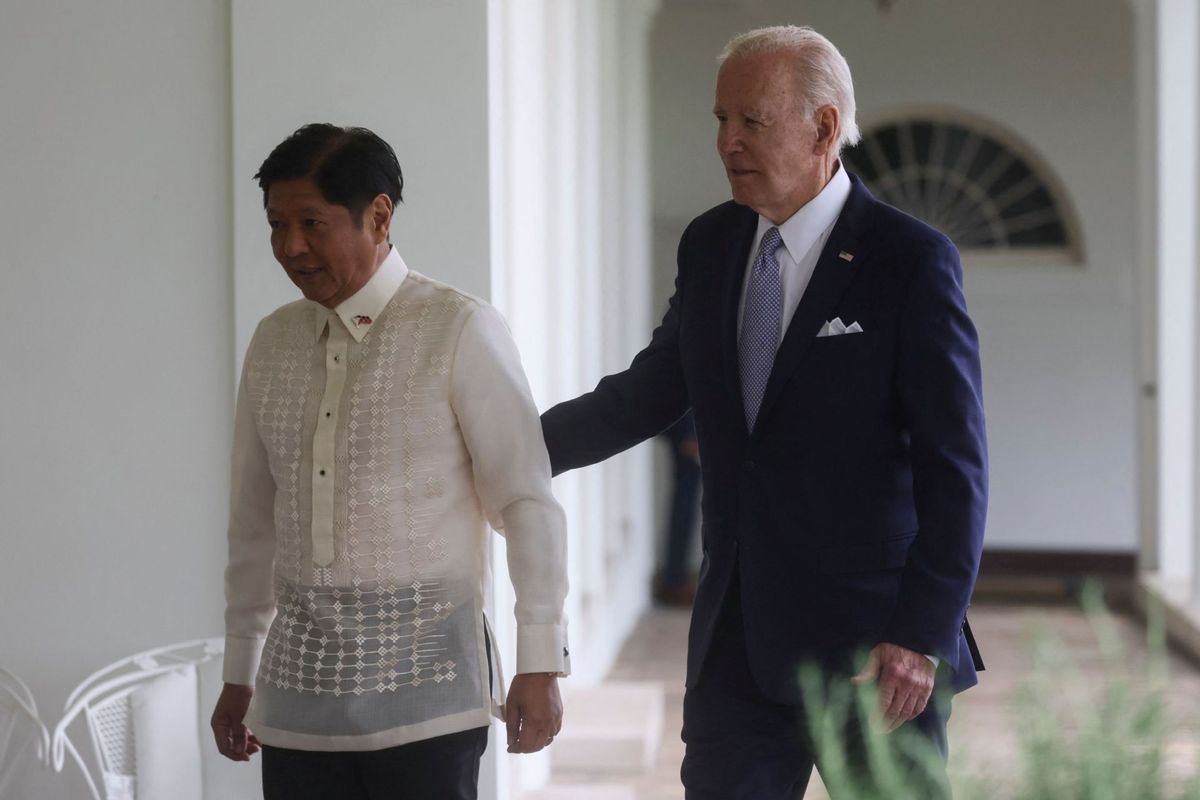Manila urged not to tow US military moves
By PRIME SARMIENTO in Hong Kong | China Daily Global | Updated: 2023-05-05 09:22

Washington-led actions pose threat to peace, stability in region, forum told
The Philippines needs to resist moves by the United States to militarize the region, noting that it doesn't only hurt peace and stability but also undermines the Southeast Asian country's sovereignty, a forum heard on Thursday.
The US is making the disputes over the South China Sea as excuses for it to use the Philippines as a launchpad for its military operations in the Asia-Pacific region, according to analysts and activist leaders who participated in a forum on the Philippines-US relations.
The hybrid forum in Manila was held as Philippine President Ferdinand Marcos Jr paid a four-day visit to the US.
Roland Simbulan, vice-chairperson of the Center for People's Empowerment in Governance, a Manila-based think tank, has warned against the Philippines-US military agreements, including the recent decision to give the US access to four new military facilities under the Enhanced Defense Cooperation Agreement, or EDCA.These sites, he said, have made the Philippines a "sitting duck" for a US-instigated conflict in the region.
"The Philippines is again in the direct line of fire in the US war machine," Simbulan said, noting this has also been the case when the US military had bases in the northern Philippine provinces of Pampanga and Zambales.
The bases were shut after the Philippine Senate voted against the Philippines-US Bases Treaty in 1991.
Simbulan said the US has a history of aggression and intervention, and warned that the EDCA could be used to contain China and intervene in its Taiwan island. He said that under such an agreement, the Philippine foreign policy has been "militarized".
He said the Philippines needs to focus on its priority — which is economic development. But in order to make that possible, it's necessary to have peace in the region. He said conflicts will only weaken the Philippine economy.
Francisca Castro, deputy minority leader at the Philippine House of Representatives, said instead of de-escalating tensions, the expanded US-Philippines military agreement is only heightening the rivalry between China and the US.She said with the South China Sea as a potential flashpoint, it's the ordinary Filipino citizens and the country's resources that will be caught in the middle of any potential conflict.
Castro said that instead of relying on the US military, the Philippines can use more diplomatic means to resolve disputes with China over the South China Sea.
Beijing firmly opposes any countries using bilateral treaties to interfere in the South China Sea issue and undermine China's territorial sovereignty as well as maritime interests and rights, Foreign Ministry spokeswoman Mao Ning said on Thursday.
She made the remarks when asked about a US move to reaffirm its decades-old security alliance with the Philippines.
"The South China Sea is a shared home for the countries in the region, and should not be a hunting field for external forces," Mao told reporters at a regular news conference.
Trust, unity and cooperation among regional countries are the keys to safeguarding peace and stability in the South China Sea, she said, calling for relevant countries to take the initiative to properly handle differences.
Liza Maza, general secretary of the International League of Peoples' Struggle and former member of the Philippine House of Representatives, said the US is using military agreements like the EDCA to pursue its own agenda.
Maza said the Philippines has a strategic location and the US presence in the country will allow it to control the booming regional trade in the region.
Maza cited last month's US-Philippines joint military exercise — the largest iteration of the annual exercise more known as Balikatan (shoulder-to-shoulder).
"Balikatan is a showcase for US military hardware," Maza said, noting that weapons manufacturing is a profitable industry in the US.
Livelihood disrupted
Ronnel Arambulo, spokesperson for the Federation of Small Fisherfolk Organizations in the Philippines, has spoken against Balikatan.
He said the exercise has disrupted the livelihood of small fisherfolk as they were not allowed to fish when drills were being done. They were only compensated by some bags of rice and canned goods which are not enough.
Arambulo said that what is worse is that these fishing drills are destroying their fishing grounds, threatening their source of livelihood over the long run.
Maza said that it's about time for the Philippine government to focus on improving the country's industries. By doing so, the Philippines can have enough funds to finance its own defense and security.
"Our national position should be based on our interest, which is to promote peace in the Philippines and in the region. We need to protect sovereignty and national independence," she said.
"We are for true independent foreign policy," said Wilson Lee Flores, chairman of the Anvil Business Club and moderator of the forum. Flores said that the Philippines needs to oppose neocolonialism and any move that will lead to war. He also highlighted the need for an independent mindset.
Zhou Jin in Beijing contributed to this story.
























